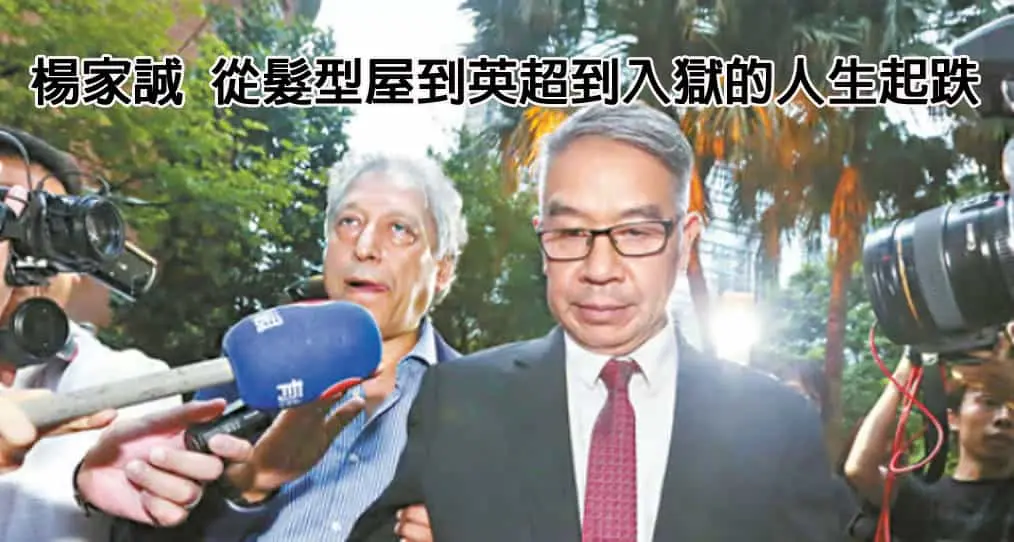Table of Contents
In the case where Yang Jiacheng was suspected of laundering more than 720 million yuan, a former broker of Lippo Securities revealed that Yang had deposited 6.3 million yuan in cash into the bank, calling it a "covering position" operation that was more efficient than remittance or checks. The prosecution questioned this statement, pointing out that 6.3 million yuan in thousand-dollar notes stacked up would be about half a meter high, which is not a small amount.

1. Case Background: From Football Tycoon to Prisoner
- The rise and controversy of Yang Jiacheng
- A brief account of Yeung Ka Shing's rise to fame: from being a hair salon owner to becoming the first Chinese owner of Birmingham Football Club, and how he became the focus of Hong Kong's business community.
- Suspicion over source of wealth: He was first investigated by the Independent Commission Against Corruption in 2011, which revealed the abnormal flow of HK$720 million in funds.
- Key points of the charge: Money laundering was carried out through five puppet accounts between 2001 and 2007, with the scale of the money involved setting a record in Hong Kong's judicial history.
- Case specificity analysis
- Cross-border capital operations: a money laundering network that combines mainland investment projects (such as Star Media Group), the Hong Kong securities market and the overseas football industry.
- Judicial challenges: Cash transaction traces are weak and the prosecution relies on financial experts to reconstruct the capital chain, highlighting the difficulty of anti-money laundering evidence collection.
2. Focus of the Trial: Dispute over the Efficiency of Cash Deposits
- The core of the prosecution's questioning: the rationality of the 6.3 million cash deposit
- Contradiction at the physical level: Financial experts calculated the volume of 6.3 million thousand-yuan banknotes (about 0.5 meters high and weighing 7.3 kilograms), questioning the "replenishment efficiency theory" as contrary to common sense.
- Comparison of industry practices: Large transactions in the securities industry generally use checks or remittances, and cash transactions can easily trigger anti-money laundering alerts.
- Pan Ji's testimony controversy
- Conflict of interest revealed: Pan Ji admitted to investing 2.15 million in Yang Jiacheng’s mainland projects and holding 305 million shares of Hongfeng International, which impacted his neutrality as a witness.
- "Regular customer vs. partner" debate: The prosecution focused on Pan Ji's role as non-executive director of SMI Group, implying that he was deeply involved in Yang's business network.
3. Decoding the corporate network: the capital maze of Star Media Group and Sing Pao Media
- Analysis of the Equity Structure of Star Media Group
- Yeung Ka Shing held 25% shares in Star Media through shell companies, and the group was later reorganized into the Sing Pao media empire.
- Money flow path: Money laundering allegations point to the use of the cash flow characteristics of the media industry to conceal the source of illegal funds.
- Hongfeng International's leverage game
- The acquisition of Birmingham Football Club was a leveraged buyout of HK$220 million, and it was suspected that the source of funds involved underground banks.
- Abnormal stock price fluctuations: Between 2007 and 2009, stock prices rose and fell sharply, which was suspected to be market manipulation in conjunction with money laundering.
IV. Judicial Offense and Defense: Insights into the Strategies of the Prosecution and the Defense
- Construction of the prosecution chain of evidence
- Application of financial forensics technology: Reconstructing the money laundering network by analyzing the transaction frequency, geographical distribution and associated accounts of 5 puppet accounts.
- Psychological tactics: The prosecutor used the fact that the jury had never seen millions of cash to reinforce the jury's cognitive gap about abnormal transactions.
- Defense strategy analysis
- Cutting off business cooperation and money laundering: Pan Ji’s investment was a personal business judgment and had nothing to do with Yang Jiacheng’s financial operations.
- Questioning expert testimony: Challenging the practical feasibility of cash volume calculations (e.g., thickness differences between old and new banknotes, banks’ rapid cash counting process).
Case number: DCCC860/13
Further reading:




